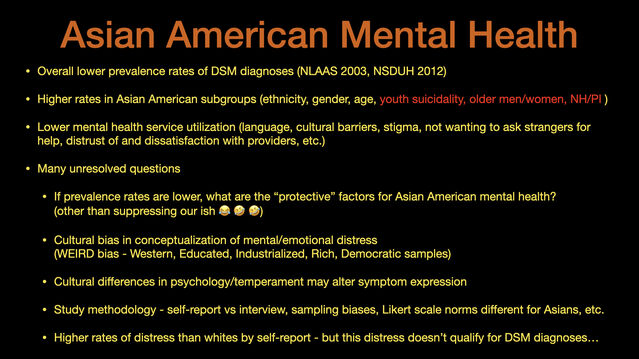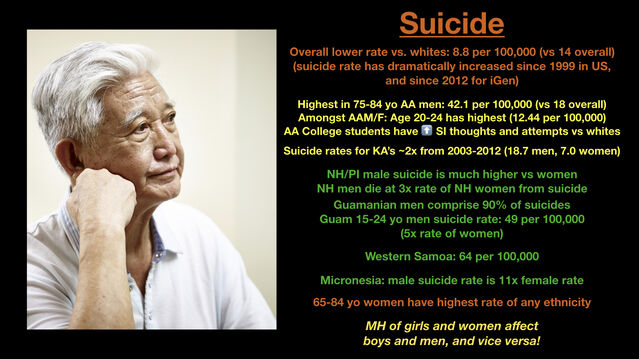Health
Asian American Mental Health: Worsened During the Pandemic
Stop AAPI Hate's comprehensive report details current mental health challenges.
Posted June 6, 2021 Reviewed by Devon Frye
Key points
- Asian American mental health has worsened during the pandemic, which brought numerous challenges and coincided with prominent hate incidents.
- Reporting hate incidents reduces mental health distress and sequelae, a new report finds.
- Asian Americans face unique subordination, safety, survival, and identity challenges because American culture still misperceives us.
The nonprofit organization Stop AAPI Hate has just released a comprehensive report on Asian American Mental Health during the pandemic and time of increased visibility of anti-Asian hate. I recommend that you read the report in its entirety (see references). “This report features the findings from three research projects that investigated the effects of anti-Asian racism on mental health among Asian Americans during the pandemic: (1) Stop AAPI Hate Follow-Up Survey (Saw et al.), (2) National Anti-Asian American Racism Study (Liu et al.), and (3) COVID-19 Adult Resilience Experiences Study (Hahm et al.).”
Below are some key findings pulled from the report followed by my own reflections. Of special significance is the finding that reporting hate incidents reduced distress and mental health sequelae. So it’s very important that if something happens to you, find a willing ear. You can also report it at Stop AAPI Hate.
“Asian Americans and Pacific Islanders are experiencing unprecedented and growing health inequity issues brought on by the COVID-19 pandemic and anti-AAPI hate. While racism targeting Asian Americans is not new in U.S. history with exclusionary immigration policies that systemically barred immigration from Asia until 1965, the antagonistic U.S.-China relations and inflammatory political rhetoric about the virus (e.g., “China virus”) exacerbated racism against Asian Americans."
Overall Key Findings
- Asian Americans who have experienced racism are more stressed by anti-Asian hate than the pandemic itself (Saw et al.).
- One in five Asian Americans who have experienced racism display racial trauma, the psychological and emotional harm caused by racism (Saw et al.).
- After reporting, Asian Americans who have experienced racism have lower race-based traumatic stress (Saw et al.).
- Asian Americans who have experienced racism have heightened symptoms of depression, anxiety, stress, and physical symptoms (Liu et al.).
- Experience of racism during COVID-19 is found to be more strongly associated with post-traumatic stress disorder (PTSD) symptoms (Hahm et al.).
My Reflections an Asian American Psychiatrist
Prior to the pandemic, AAPIs as a group reportedly had a lower incidence of DSM diagnoses. However, rates of DSM diagnoses varied depending on age, gender, and ethnic subgroup. (See slides below.) Asian Americans also self-reported higher levels of distress that did not qualify for DSM diagnoses.
I have hypothesized that Asian Americans have suffered from particular forms of cultural distress that do not qualify for DSM diagnoses. I’ve called this “complex relational-cultural distress,” comprised of transhistorical, intergenerational, familial, and cultural trauma (the latter including incidents of racism and other forms of discrimination and marginalization).
Another way to look at this distress that doesn’t qualify for DSM diagnosis is to consider the threats to identity, belonging, and wellness that Asian Americans uniquely face. I believe Asian Americans face unique safety, subordination, and survival challenges. The culture does not really understand us. We are still anomalies in the cultural milieu, subject to the perpetual foreigner and model minority myths.
We are disentangling ourselves from these outsider myths, but too many of us subscribe to the achievement myth. This myth suggests that if we achieve enough, then we will become insiders. This myth supports the individualistic, tribalistic, and power-based mythos historically centered on and amplifying White males. This myth also amplifies the immigrant narrative that security comes from achievement and status—which is only partially true. Safety and security are actually enhanced by relatedness and a cultural commitment to overcome racism and other subordination pressures.
I believe we have to continue to transcend this mythos to move towards belonging. That is a relational challenge. So for Asian Americans, our challenge as a community becomes “how do we relate to our distress, and how do we relate to each other?”
We absolutely have to create community amongst ourselves, and not simply try to fit into an old, White-centric model of American identity. We must work towards equality, inclusivity, and interdependence, across all our diverse identities.
(c) 2021 Ravi Chandra, M.D., D.F.A.P.A.
For more on Asian American mental health, see my 2019 SF Love Dojo Lecture Series online, which include these slides:


References
Saw A, Yellow Horse AJ, Jeung R. STOP AAPI HATE MENTAL HEALTH REPORT
For further reading:
Chandra R. How We Should Respond to Anti-Asian Racism, Hogg Foundation for Mental Health blog, May 10, 2021 Chandra R. All Mental Health is Cultural Mental Health, Newsletter of the Northern California Psychiatric Society, May 21, 2021



